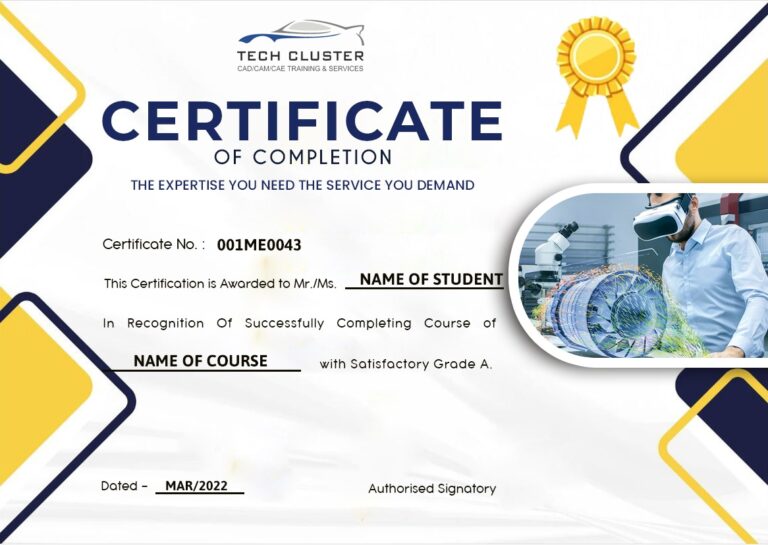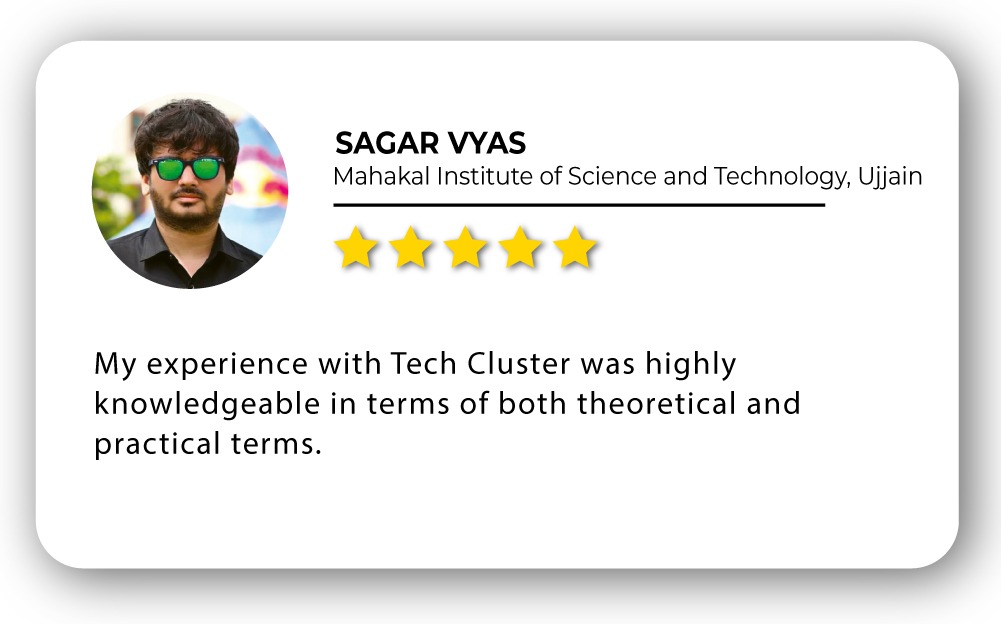
ANSYS Training Institute in Indore
- Real-Time Experts Sessions
- LIVE Project
- Certification
- Affordable Fees
- Flexibility
- Placement Support
ANSYS is a Computer aided Engineering Design and Simulation tool headquartered in south Pittsburgh in Cecil Township, Pennsylvania, United States and was established in year 1970. Ansys is a software mainly used to simulate interactions of all disciplines of physics, structural, vibration, fluid dynamics, heat transfer and electromagnetics for engineers, scientists and physicists.
ANSYS enables you to simulate tests and working conditions, by creating a virtual test environment before manufacturing prototypes of products and improving weak points, computing life and foreseeing probable problems are possible by 3D simulations in virtual environment.Ansys is a software used across the product life cycle which needs a better understanding to grow as a career.
Tech Cluster is considered as one of the Best Ansys Training Institutes in Indore, helps students to discover innovative ways covering all important aspects of Ansys Training from basic to advanced level.
Application
Ansys Multiphysics is a versatile tool for CAE professionals used across a wide range of industries, like Aerospace & Defense, Automobile & Transportation, Marine Engineering, Education, Manufacturing, Fast Moving Consumer Goods, Automation etc for structural, thermal, thermo-structural, electrical, electronic, Radio Frequency, electro-mechanical, electro-magnetic, peizo-electric, fluidic dynamics, chemical interactions and all possible physics, chemical and engineering interactions.
Course Highlights:
ANSYS Foundation :
- Ansys Workbench & FEA
- Ansys Fluent
- Ansys Heat Transfer
- Structure Non- Linear
Duration :
- 30 Hours Theory
- 30 Hours Practical
- 20 Hours Project work
Technical Features:
Static Structural Analysis:
● Explanation: Imagine a bridge holding its weight, or a building standing tall. Static structural analysis is the foundation for understanding how structures behave under constant loads (forces that don’t change over time). This module dives deep into the science behind stress, strain, and deformation. You’ll learn how to analyze these factors in various structures, from bridges and buildings to machines and everyday objects.
● Applications: This knowledge is the backbone of safe and efficient structural design across various engineering disciplines. Civil engineers use it to ensure buildings and bridges can withstand their own weight and everyday use. Mechanical engineers apply it to design machines that can handle operational loads. Aerospace engineers rely on it to create lightweight yet strong structures for aircrafts and spacecraft.


Transient Structural Analysis:
● Explanation: The world is full of dynamic forces! Earthquakes, impacts, vibrations – these are all transient loads that can affect structures. This module focuses on analyzing the behavior of structures under these dynamic conditions. You’ll learn how to simulate real-world scenarios like earthquakes, crashes, and explosions. By understanding how structures respond to these transient events, you can design them to be more resilient and withstand the unexpected.
● Applications: From designing earthquake-resistant buildings to crashworthy vehicles, transient structural analysis plays a crucial role in various fields. It’s used to create safer structures for our everyday lives. This analysis is also valuable for designing components in machinery that experience rapid loading or impacts.


Steady-State Thermal Analysis:
● Explanation: Heat is everywhere, and understanding its flow is essential for efficient design. This module equips you with the skills to analyze how heat distributes within a system at a specific point in time. You’ll learn to simulate heat transfer in various applications, like electronic devices that generate heat or heat sinks designed to dissipate it. By mastering this analysis, you can optimize thermal management systems, ensuring components don’t overheat and function properly.
● Applications: This analysis is crucial for various industries. In electronics cooling, it helps design efficient heat sinks to prevent overheating and extend device life. In power generation, it ensures efficient cooling of turbines and generators. Even in building design, it helps optimize insulation and ventilation systems for better thermal comfort.


Modal Analysis:
● Explanation: Imagine a guitar string vibrating – that’s a simple example of a structure’s natural frequency and mode shape. This module delves into these concepts, focusing on analyzing the natural frequencies and vibration modes of structures. You’ll learn how to identify potential resonance frequencies, where vibrations become amplified and can lead to damage. By understanding these characteristics, you can design structures that avoid resonance and minimize vibrations.
● Applications: Preventing unwanted vibrations is key to ensuring the safety and functionality of structures. This analysis is crucial for bridges and buildings to minimize noise and vibrations caused by wind or traffic. In machines, it helps prevent vibrations that can lead to fatigue and component failure.


Random Vibration Analysis:
● Explanation: The world of high-impact events requires specialized analysis. This module equips you with the skills to analyze the behavior of structures and materials under rapidly changing loads, such as impacts, explosions, and other dynamic events. You’ll learn how to simulate these scenarios using advanced software, allowing you to predict how structures will deform and potentially fail under extreme conditions.
● Applications: This analysis is essential for designing structures and components that can withstand high-impact loads. It’s used in automotive safety engineering to create crashworthy vehicles that protect occupants. It’s also valuable for designing protective equipment like helmets and body armor used in extreme sports or military applications. Additionally, this analysis plays a role in designing components in machinery exposed to rapid loading or impacts.


Explicit Dynamics Analysis:
● Explanation: The world of high-impact events requires specialized analysis. This module equips you with the skills to analyze the behavior of structures and materials under rapidly changing loads, such as impacts, explosions, and other dynamic events. You’ll learn how to simulate these scenarios using advanced software, allowing you to predict how structures will deform and potentially fail under extreme conditions.
● Applications: This analysis is essential for designing structures and components that can withstand high-impact loads. It’s used in automotive safety engineering to create crashworthy vehicles that protect occupants. It’s also valuable for designing protective equipment like helmets and body armor used in extreme sports or military applications. Additionally, this analysis plays a role in designing components in machinery exposed to rapid loading or impacts.


Fluid Flow (Fluent):
● Explanation: Fluids are everywhere, from the air we breathe to the water we drink. This module introduces you to Ansys Fluent, a powerful software tool used to simulate fluid flow, heat transfer and mass transfer. You’ll learn how to model and analyze various fluid flow phenomena, gaining insights into how fluids behave in different situations. This includes simulating how fluids flow through pipes and ducts, understanding the aerodynamics of objects moving through air, and analyzing heat transfer in heat exchangers. By mastering these skills, you can design efficient and optimized fluid flow systems across various applications.
● Applications: This knowledge is valuable in diverse fields. In mechanical engineering, it helps design efficient pumps and turbines, crucial for various applications like power generation and water transportation. In aerospace engineering, it’s used to optimize the aerodynamics of aircrafts for improved fuel efficiency and performance. Chemical engineers utilize this expertise to design efficient chemical reactors and optimize fluid mixing processes. Even in civil engineering, it helps analyze and optimize fluid flow in drainage systems and water treatment plants.


Upcoming Batches
Certifications

ANSYS Certification Training
About ANSYS Certification Training in Indore at Tech Cluster

















